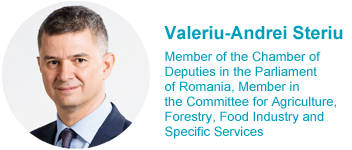The next generation of European farmers
Wednesday, Mar 20, 2019
Before becoming a member of Parliament, I was a young dairy farmer. As a former owner and manager of a family dairy farm I believe I have a be good insight in understanding young farmers’ struggles. The stress is high when you have to cover daily costs and at the same time try to sell quality products, while every 7 years spending time adapting to the new politics coming from Brussels.
Since the year 2000 I have been following, as a politician, the CAP reform process. The one that started in 2012 was at the time when the Commissioner for Agriculture was from Romania. The 2014-2020 CAP reform was done after a public consultation with hundreds of stakeholders. Fortunately, the Commission is keeping up the good work in providing public consultation on the future of the CAP: during the 2017 public consultation it received more than 320,000 replies on the policy within 3 months.
Since becoming a member of the EU in 2007, Romania has been doing its best in the agricultural sector, despite a slow start with regard to direct payments. In 2007 only 25% of the direct payment was available at that time for farmers, but in the following years this figure has increased.
Romania is currently making very good progress on structural changes so that all farmers, but also consumers and the administration, are participating in the shaping of the future CAP. The EU must continue the good job in refreshing the CAP for 2021-2027 and definitely some of the announced objectives are extremely welcome, such as the support for viable farm income, a greater focus on research, and all the contributions to climate change mitigation or sustainable energy.
Unfortunately, more and more young people prefer to move from rural areas to the cities. First of all, they cannot manage the property on their own or stand to inherit the family farm. Secondly, young people educated in the city prefer to maintain a lifestyle that is not available in rural areas and after starting a family and having children they want to provide them with a good education. Good schools are not often available in rural areas and providing a high quality of life remains a problem.
The number of young farmers goes down every year: the EU has 21.2% farmers under 44 years and 55.8% over 55 years. In Romania, the situation is worse: 18.8% under 44 years and 64.5% over 55 years. Almost all of the Romanian qualified agricultural labour force in the last 10 years moved to Western countries to work for more money in other fields.
Attracting young people to rural areas requires an increase of the quality of education, improved infrastructure (electricity, water sewage, and better internet connections) and enhanced social life within rural areas by identifying attractive places where they can socialize. Also, more funds are imperative and increasing the young farmer grants is a good option, from 50,000 Euro to 100,000 Euro; a total of 1 billion EUR for 10,000 new young farmers.
Building the future of European Agriculture can only be accomplished through a massive reform. It is crucial to start debating this reform as soon as possible and the FFA provides the perfect frame for it.
In addition to encouraging and supporting young farmers, we must also take into consideration other important aspects, such as European demographics, rural education, incorporating modern technology in agriculture and many more.


